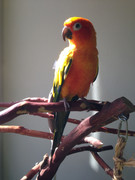BoomBoom
Well-known member
- May 2, 2012
- 1,722
- 58
- Parrots
- Boomer (Sun Conure 9 yrs), Pewpew (Budgie 5 yrs), Ulap (Budgie 2 yrs), Eight & Kiki (Beloved Budgies, RIP)
Boomer's Routine Wellness Exam: 10% Gram Negative Rods (Bacterial Infection?)
Hello, everyone! I'm here on slight panic mode. Hoping to hear from others with information or similar experiences. When I finished writing the post, I realized I was too verbose so I summarized it in bold below:
Has your bird been tested with 90% positive gram, 10% negative gram before? How did they get it? What would have happened if I put off the wellness exam and never found out about the bacterial infection? Would it have gone away on it's own or would he have been violently ill?
If you want to read on, here's the novelized version:
Boomer is a 6 1/2 year old sun conure. He is acting normal but was overdue for a wellness exam so I took him to his Avian Vet last week. Physical test was good. Vet said he had a strong heart and lungs. Was told that his diet and supplementation were excellent care (his words) but need to reduce almonds / pistachios (was giving 5-6 per day). His comprehensive avian profile (blood test) was good which meant heart, liver, kidneys were okay. All that said, it takes advanced imaging or histo to know 100%. Standard culture and sensitivity test showed that he has 90% gram positive rods (good) BUT has 10% gram negative rods (not good). All his past culture tests had 0% gram negative rods. They gave me an oral prescription of Baytril for 10 days, twice daily. So he got a bacterial infection from something. I asked them how he could have acquired this and was told it could be from literally anything: contaminated food, water, contact with droppings...
I'm OCD when it comes cage cleaning (daily) and food handling. I asked them, if I had not taken him for a wellness exam and I didn't find out about the infection, what would have happened to Boomer? They said sometimes their immune system fights it. I guess if the immune system fails, I'd have a visibly sick bird. I tried to search online to find out if there is a germ associated with the infection (link: https://www.beautyofbirds.com/bacterialinfection.html) but I couldn't find it in the lab report. I also came upon an informative article on gram stains (link: http://avianmedicine.net/wp-content/uploads/2013/03/gramstain2.pdf) where I see some similar reports of 90% gram positive, 10% gram negative.
My own research didn't get me closer to understanding how Boomer may have gotten the infection, hence my post. Has anyone received a similar culture test before? How did your bird get the infection? Did they manifest any visible symptoms? Boomer looked completely fine to me, was eating, plumage looked good, droppings, etc. I know parrots hide signs of illness but still? Vet said it was nothing to worry about and that this happens. Am I overreacting?
---------------------
Copy of Lab Report

Boomer says hello!

Hello, everyone! I'm here on slight panic mode. Hoping to hear from others with information or similar experiences. When I finished writing the post, I realized I was too verbose so I summarized it in bold below:
Has your bird been tested with 90% positive gram, 10% negative gram before? How did they get it? What would have happened if I put off the wellness exam and never found out about the bacterial infection? Would it have gone away on it's own or would he have been violently ill?
If you want to read on, here's the novelized version:
Boomer is a 6 1/2 year old sun conure. He is acting normal but was overdue for a wellness exam so I took him to his Avian Vet last week. Physical test was good. Vet said he had a strong heart and lungs. Was told that his diet and supplementation were excellent care (his words) but need to reduce almonds / pistachios (was giving 5-6 per day). His comprehensive avian profile (blood test) was good which meant heart, liver, kidneys were okay. All that said, it takes advanced imaging or histo to know 100%. Standard culture and sensitivity test showed that he has 90% gram positive rods (good) BUT has 10% gram negative rods (not good). All his past culture tests had 0% gram negative rods. They gave me an oral prescription of Baytril for 10 days, twice daily. So he got a bacterial infection from something. I asked them how he could have acquired this and was told it could be from literally anything: contaminated food, water, contact with droppings...
I'm OCD when it comes cage cleaning (daily) and food handling. I asked them, if I had not taken him for a wellness exam and I didn't find out about the infection, what would have happened to Boomer? They said sometimes their immune system fights it. I guess if the immune system fails, I'd have a visibly sick bird. I tried to search online to find out if there is a germ associated with the infection (link: https://www.beautyofbirds.com/bacterialinfection.html) but I couldn't find it in the lab report. I also came upon an informative article on gram stains (link: http://avianmedicine.net/wp-content/uploads/2013/03/gramstain2.pdf) where I see some similar reports of 90% gram positive, 10% gram negative.
My own research didn't get me closer to understanding how Boomer may have gotten the infection, hence my post. Has anyone received a similar culture test before? How did your bird get the infection? Did they manifest any visible symptoms? Boomer looked completely fine to me, was eating, plumage looked good, droppings, etc. I know parrots hide signs of illness but still? Vet said it was nothing to worry about and that this happens. Am I overreacting?
---------------------
Copy of Lab Report

Boomer says hello!

Last edited:

